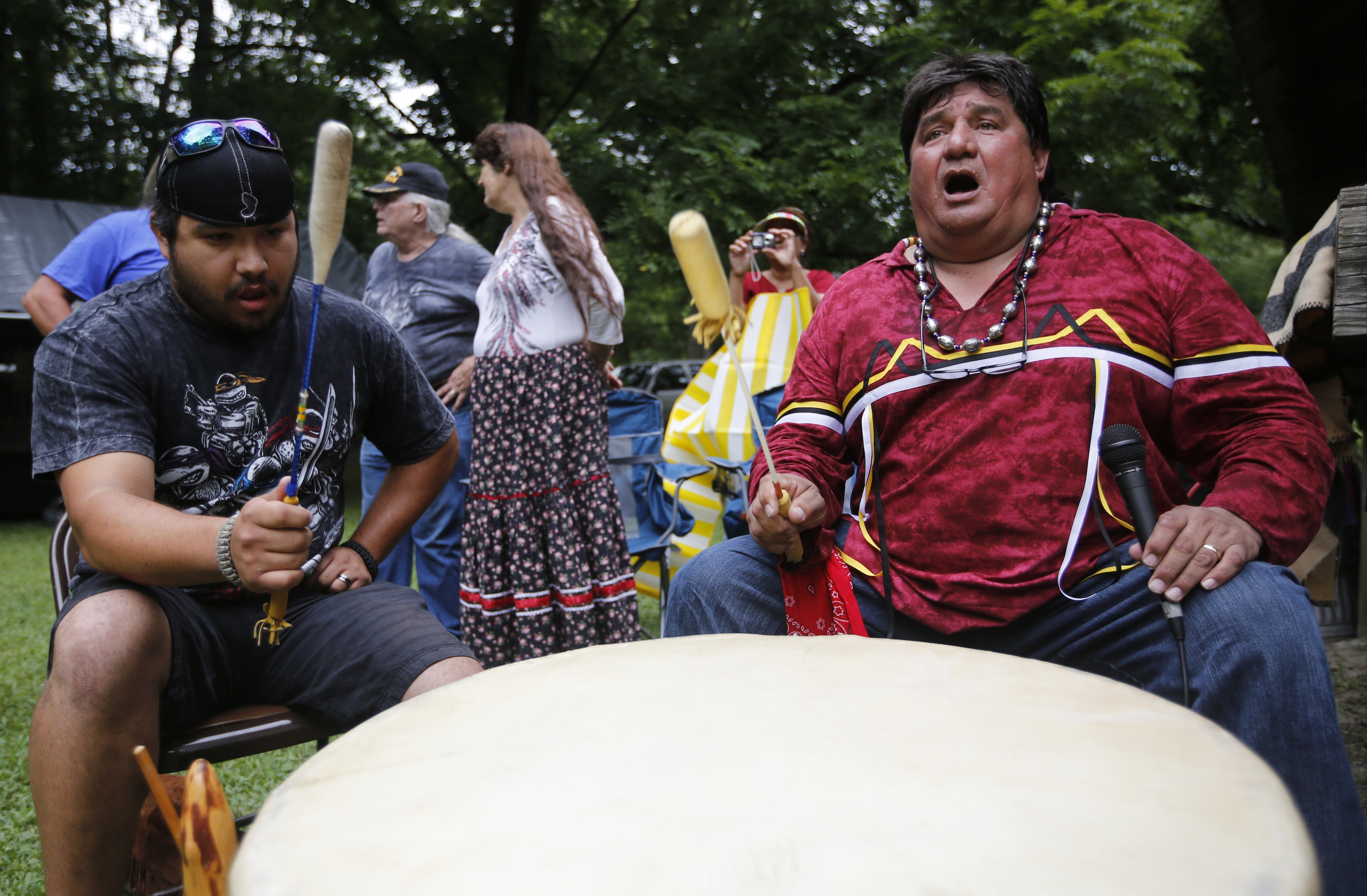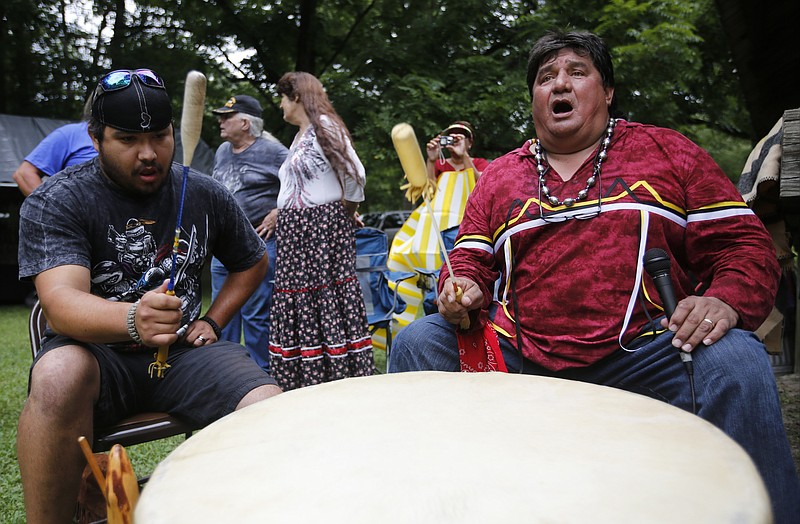If you go
All events will take place at Red Clay State Historic Park in southern Bradley County.A flag-raising ceremony will take place at 9 a.m. today, followed by the Tri-Council Meeting of the three federally recognized tribes of the Cherokee at 10 a.m. beside the Council House on park grounds. The meeting is open to the public.Visitors can join a park regional interpreter and park naturalist for programs on birds of prey at 1 and 3 p.m. and Cherokee herbal and medicinal plants at 2, 3 and 4 p.m., as well as other activities.The Tri-Council Festival will be from 10 a.m. to 5 p.m. Saturday and Sunday with traditional music, dance, food, crafts, exhibits and games. There is a $5 suggested donation per vehicle entering the festival.
Divided by war, treaties and the Trail of Tears, the three federally recognized tribes of the Cherokee will come together today at Red Clay State Historic Park for the first time since the Removal.
Red Clay, 12 miles south of Cleveland, Tenn., was the last seat of Cherokee government before its removal more than 175 years ago.
This morning, the three tribes will open the day's activities with a ceremonial raising of the three tribal flags, followed by a tri-council meeting on the site of the original Council House. The Eastern Band of Cherokee Indians are the hosting tribe for this year's meeting.
"The last time we met in Red Clay we were discussing the Indian Removal Act policy of the United States," said Joe Byrd, speaker and former chief of the Oklahoma-based Cherokee Nation. "Now we're coming back to discuss our common ground, and we're going to embrace the spirit and commonality that we have today.
"The theme is 'We all come from one fire.'"
THREE PATHS, ONE PEOPLE
The meeting today at Red Clay concludes a week of tri-council meetings for the Cherokee Nation tribe from Oklahoma; Eastern Band of Cherokee in Cherokee, N.C.; and the United Keetoowah Band, also of Oklahoma.
The three tribes arose from decisions by different Cherokee leaders beginning in the late 1700s and early 1800s, when those who would become the Keetoowah people first decided to leave their ancestral home in what is now Tennessee, Georgia, Alabama, North Carolina and South Carolina.
While many Cherokee embraced the white settlers' ways as a means to keep the peace, the more conservative Keetoowah Cherokee, sometimes called Kituwah, were not among them. They migrated to a new home in Arkansas by the late 1790s. In 1808, a delegation of Cherokee went to Washington, D.C., to inform the president of the United States that not all Cherokee wanted to pursue a "civilized" life, according to the United Keetoowah Band website. In 1817, the United States ceded lands on the Arkansas and White rivers to the Keetoowah people. In 1828, they entered a treaty to move to the Indian Territory in Oklahoma.
The Cherokee Nation group identifies itself as the people subjected to the Removal in 1838 and 1839 after gold was discovered in the Georgia hills. The group re-established itself with communities, churches, schools and newspapers in Indian Territory. The people reconstructed their society from the remnants of their culture from Georgia, leading to what is considered the Cherokee's golden age between the 1840s and 1860s. That ended with the Civil War when loyalties divided the tribe, triggering a federal backlash against those who sided with the Confederacy. In the late 1890s, Cherokee tribal land was divided and split up among Cherokee listed in the census compiled by the federal government, making up today's Cherokee Nation tribe.
 Ammons Rattler, left, and Rick Bird play a drum and sing during a dance demonstration in August 2014 at the Cherokee Heritage Festival at Red Clay State Park in Cleveland, Tenn. Today, the park will host a tri-council meeting of the Cherokee that will bring the three federally recognized tribes together at Red Clay for the first time.
Ammons Rattler, left, and Rick Bird play a drum and sing during a dance demonstration in August 2014 at the Cherokee Heritage Festival at Red Clay State Park in Cleveland, Tenn. Today, the park will host a tri-council meeting of the Cherokee that will bring the three federally recognized tribes together at Red Clay for the first time.The only Cherokee who remained in their homeland were those who were excluded through North Carolina's Reservation Act of 1819 or who dodged the federal army sent to root them out of the hills. Historical accounts of the Eastern Band of Cherokee Indians say an adopted Cherokee named Will Thomas used Cherokee money to purchase land he held in his name for Cherokee who were fleeing removal. Those Cherokee were able to stay and work the land until after the Civil War ended when, with some legal maneuvering, the Cherokee in North Carolina were able to form a corporation, which can hold land.
The Eastern Band of Cherokee Indians obtained a corporate charter from North Carolina in 1870 and adopted a constitution under which the band continues to operate today in western North Carolina near the city of Cherokee.
The three tribes have met annually since 2012, each taking its turn as host.
"It's been close to 170-something years since these three Cherokee tribes have gathered here," Byrd said on Thursday. "What we'll do at Red Clay is look at resolutions to find common ground to where we, as a unit of the three tribes, see if we can move issues forward like Indian Child Welfare, economic development, more sovereignty over the foods that are distributed to our people."
Despite the business at hand, the gathering will be bittersweet.
"John Ross was our chief during the Removal. He said, 'We were overwhelmed. Our hearts were sickened,'" Byrd quoted. "When you read that it's hard to imagine what actually took place. Today, yes, our hearts are still saddened over what took place, but we have joy in that we overcame."
Contact staff writer Ben Benton at bbenton@timesfreepress.com or twitter.com/BenBenton or www.facebook.com/ben.benton1 or 423-757-6569.
